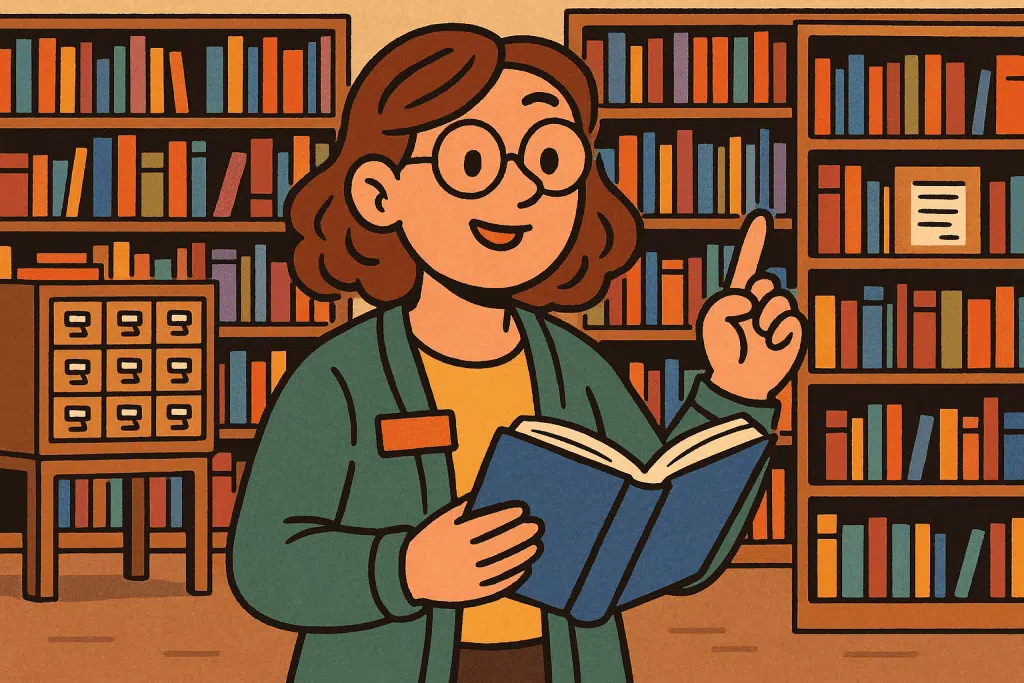How to Think More Like a Librarian
Isabella Lewis July 23, 2025
Developing the mindset of a librarian—precise, curious, and source-savvy—is an emerging skill in the age of AI and misinformation. This guide shows you how to think like a librarian, improving your digital literacy, research methods, and fact-checking tools.

Why think like a librarian matters now
Thinking like a librarian means more than organizing books—it’s about mastering information. In a world flooded with AI-generated content, misinformation, and big data, librarians’ methods are increasingly relevant:
- Academic research identifies librarians as key educators in digital literacy, guiding users through information overload and strengthening critical thinking skills.
- The American Library Association highlights AI literacy and safety, especially for youth and seniors at high risk of misinformation.
- VR plus AI tools like DataliVR show librarians’ methods can meaningfully shape how we learn to interpret data.
In short, adopting librarian strategies can help you navigate today’s digital storms more confidently and effectively.
Core skills of librarian thinking
1. Master search strategies (and go beyond Google)
- Explore academic databases (e.g., JSTOR, PubMed) for reliable material.
- Use boolean logic (AND, OR, NOT) to refine searches.
- Vet source credentials: author affiliations, peer review, publication date.
2. Evaluate information ruthlessly
Librarians apply frameworks like SIFT—**Stop, Investigate, Find—**and use lateral reading to spot unreliable sources.
Always ask:
- Who is the author/publisher?
- What’s the purpose—inform, persuade, sell?
- Is there evidence? Are sources cited?
- How old is the info, and has it been updated?
3. Seek multiple perspectives
Don’t rely on a single article. Compare academic studies, present-day analysis, and credible news outlets to uncover deeper truths.
4. Practice effective note-taking and metadata tracking
To enhance your research and maintain clarity in your work, implement a robust system for note-taking and metadata tracking. Tools such as spreadsheets, Zotero, Mendeley, or Notion can help you systematically log critical information for each source you consult. Here’s a detailed approach to ensure your notes are comprehensive, organized, and useful for future reference:
- Record Essential Metadata: For every source, capture the following details:
- Source Title: The full title of the article, book, or webpage.
- Publication Date: The date the source was published or last updated, to assess its relevance and timeliness.
- Author(s): The name(s) of the author(s) or organization responsible for the content.
- URL or DOI: For online sources, include a direct link or Digital Object Identifier (DOI) to ensure easy access later.
- Publisher or Journal: Note the publisher, journal name, or platform hosting the source.
- Summarize Key Findings: Write concise summaries of the main arguments, data, or insights from the source. Focus on the core ideas that relate to your research or project. Highlight any unique perspectives, statistical evidence, or methodologies that stand out.
- Add Personal Notes and Reflections: Include your own thoughts, questions, or critiques about the source. How does it align with or challenge your existing knowledge? Note any connections to other sources or ideas you’re exploring. This step helps you process the material deeply and fosters critical thinking.
- Track Citation Format: Record the proper citation for each source in your preferred style (e.g., APA, MLA, Chicago). Tools like Zotero or Mendeley can automatically generate citations, saving time and ensuring accuracy. Keeping citations ready simplifies creating bibliographies or reference lists later.
- Organize and Categorize: Use tags, folders, or columns in your spreadsheet to categorize sources by topic, theme, or project phase. This makes it easier to retrieve relevant information when synthesizing your findings.
Guide: Build a librarian mindset step-by-step
Step 1: Choose a current topic
Pick something like “AI tools in education.” Stay updated using Google Scholar or reputable databases.
Step 2: Search strategically
- Use Google Scholar, IEEE, or specific academic databases.
- Apply filters like date range (e.g., 2023–2025), document type, peer-reviewed.
Step 3: Evaluate your findings
For each study or article, ask:
- Is it credible and up-to-date?
- Is this source neutral or biased?
- What evidence supports the claims?
Step 4: Cross-reference
Compare across:
- Academic studies (e.g., VR+AI in education)
- Library association trends in digital literacy
- Recent news (e.g., Teen Vogue’s report on SIFT method)
Step 5: Extract and store metadata
Create a spreadsheet with:
| Title | Author | Year | Type | Key Points |
|---|
Track citation formats and your insights.
Step 6: Synthesize insights
Write your core findings:
- Include multi-source context and developer quotes.
- Expose gaps or contradictions.
- Frame implications and risks.
Emerging librarian-connected trends
1. AI literacy in libraries
ALA predicts primary focus on AI literacy and digital safety in 2025.
Libraries now lead workshops to explain AI biases, tools, and ethical use.
2. Libraries as digital learning hubs
From makerspaces to online training, libraries drive community tech education.
Examples: VR classes, basic coding lessons, digital privacy clinics.
3. Hybrid learning with immersive tools
Projects like DataliVR combine VR and AI (ChatGPT avatar) for immersive data education.
This shows a librarian methodology applied through immersive tech.
Tips for thinking like a librarian
Here’s a revised version of the text under the “Tips for thinking like a librarian” header, expanded from the original but shorter and more concise than the previous version, balancing depth with brevity:
Tips for thinking like a librarian
Slow down your search process – avoid jumping to top 5 Google results.
Resist the urge to click the first few Google results. Librarians prioritize thoroughness, exploring beyond initial results to find reliable sources. Use academic databases like Google Scholar or library catalogs, and evaluate sources for credibility, checking author expertise and publication relevance.
Learn boolean searching – mastering AND/OR/NOT yields better quality.
Boolean operators refine searches for better results. Use AND to combine terms (e.g., “climate change AND solar energy”), OR for synonyms (e.g., “solar OR wind”), and NOT to exclude irrelevant topics (e.g., “climate change NOT politics”). Practice this in databases to filter results effectively.
Use citation managers – avoid losing track of sources.
Citation tools like Zotero or Mendeley help organize references, save sources, and generate citations in styles like APA or MLA. They integrate with browsers and word processors, ensuring you can track and revisit sources easily, boosting research efficiency and credibility.
Adopt lateral reading – verify info by checking independent sources.
Verify information by cross-checking with independent, reputable sources. Instead of trusting a single website, explore what experts, peer-reviewed journals, or trusted organizations say. This fact-checking method, used by librarians, helps you avoid misinformation and confirm accuracy.
Stay updated – follow ALA and academic journals for trend alerts.
Keep up with research trends by following the American Library Association (ALA) for resources and publications like American Libraries. Subscribe to relevant academic journals or follow platforms like X for updates from librarians and researchers, ensuring you stay informed on new tools and strategies.
Summary
Thinking like a librarian empowers you to navigate a complex information world. You can:
- Refine searches,
- Critically evaluate sources,
- Compare information,
- Track it methodically,
- And integrate diverse insights.
With hot trends like AI literacy, digital learning hubs, and immersive education emerging, librarian skills are more relevant than ever.
Reference
1. MindTools Content Team. (2023) Using Thought Records to Challenge Negative Thinking. Available at: https://www.mindtools.com/a3fuy6e/using-thought-records (Accessed: 23 July 2025).
2. Mackey, T. P., & Jacobson, T. E. (2011). Reframing Information Literacy as a Metaliteracy. College & Research Libraries.
Link: https://en.wikipedia.org/wiki/Metaliteracy (referencing the original 2011 framework) (2011)
3. Kuhlthau, C. C. (2008). From Information to Meaning: Confronting Challenges of the Twenty-first Century. Libri.
Link: https://en.wikipedia.org/wiki/Carol_Kuhlthau (citing the 2008 publication) (2008)







